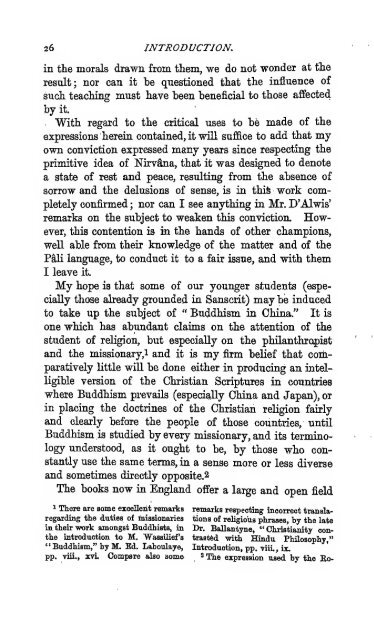Texts from the Buddhist canon : commonly known as Dhammapada
Texts from the Buddhist canon : commonly known as Dhammapada
Texts from the Buddhist canon : commonly known as Dhammapada
You also want an ePaper? Increase the reach of your titles
YUMPU automatically turns print PDFs into web optimized ePapers that Google loves.
26 INTRODUCTION.<br />
in <strong>the</strong> morals drawn <strong>from</strong> <strong>the</strong>m, we do not wonder at <strong>the</strong><br />
result; nor can it he questioned that <strong>the</strong> influence of<br />
such teaching must have heen heneficial to those affected<br />
by it.<br />
- With regard to <strong>the</strong> critical uses to he made of <strong>the</strong><br />
expressions hereia contained, it will suf&ce to add that my<br />
own conviction expressed many years since respecting <strong>the</strong><br />
primitive idea of NirvSna, that it w<strong>as</strong> designed to denote<br />
a state of rest and peace, resulting <strong>from</strong> <strong>the</strong> absence of<br />
sorrow and <strong>the</strong> delusions of sense, is in thife work com-<br />
pletely confirmed ; nor can I see anything in Mr. D'AIwis'<br />
remarks on <strong>the</strong> subject to weaken this conviction. However,<br />
this contention is in <strong>the</strong> hands of o<strong>the</strong>r champions,<br />
well able <strong>from</strong> <strong>the</strong>ir knowledge of <strong>the</strong> matter and of <strong>the</strong><br />
P§,li language, to conduct it to a fair issue, and with <strong>the</strong>m<br />
I leave it.<br />
My hope is that some of our younger students (espe-<br />
cially those already grounded in Sanscrit) may be induced<br />
to take up <strong>the</strong> subject of " Buddhism in China." It is<br />
one which h<strong>as</strong> abundant claims on <strong>the</strong> attention of <strong>the</strong><br />
student of religion, but especially on <strong>the</strong> phUanthrc^pist<br />
and <strong>the</strong> missionary,! and it is my firm belief that coih-<br />
paratively little wiU. be done ei<strong>the</strong>r in producing an intel-<br />
ligible version of <strong>the</strong> Christian Scriptures in countries<br />
where Buddhism prevails (especially China and Japan), or<br />
in placing <strong>the</strong> doctrines of <strong>the</strong> Christian religion fairly<br />
and clearly before <strong>the</strong> people of those countries, until<br />
Buddhism is studied by every missionary, and its termino-<br />
logy understood, <strong>as</strong> it ought to be, by those who con-<br />
stantly use <strong>the</strong> same terms, in a sense more or less diverse<br />
and sometimes directly opposite.2<br />
The books now in England offer a large and open field<br />
1 There are some excellent remarks remarks respecting incorrect transla-<br />
regarding <strong>the</strong> duties of missionariea tions of reUgio'us phr<strong>as</strong>es, by <strong>the</strong> late<br />
in <strong>the</strong>ir work amongst <strong>Buddhist</strong>s, in Dr. Ballantyne, " Christianity con<strong>the</strong><br />
introduction to M. W<strong>as</strong>silief's tr<strong>as</strong>tfed with Hindu Philosophy,"<br />
" Buddhism," by M. Ed. Laboulaye, Introduction, pp. viii., ix,<br />
pp. viii., xvL Compare also some a The expression used by <strong>the</strong> Eo-





